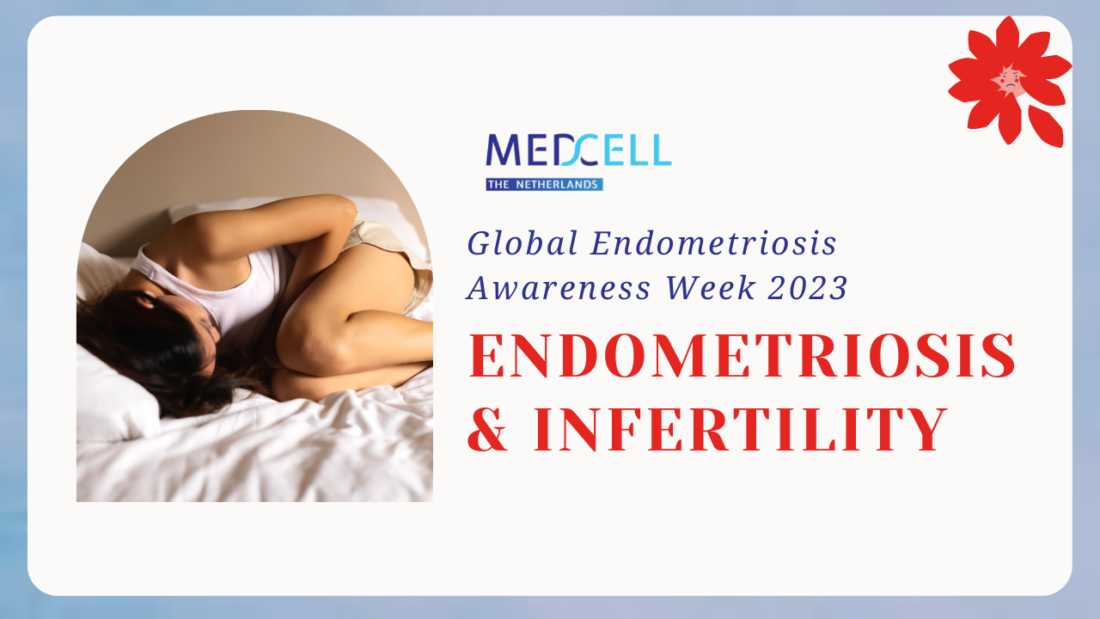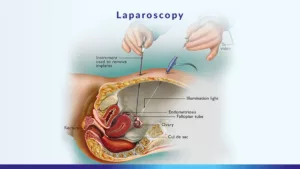Endometriosis and Infertility
In honour of Global Endometriosis Awareness Week 2023, Medcell Pharma will present one unique topic related to endometriosis throughout the week. Today’s focus is on endometriosis and infertility.
What is endometriosis?
Endometriosis is a medical condition seen in birthing people where the tissue that resembles the uterus’ lining is discovered outside the uterus (endometrium). Endometriosis may be present in:
- peritoneum (the lining of the pelvic and abdomen),
- in or on the Fallopian tubes,
- on, behind, or around the womb,
- in the region between the vagina and the rectum,
- on the bladder and intestine,
- or on the ovaries, where it can form cysts.
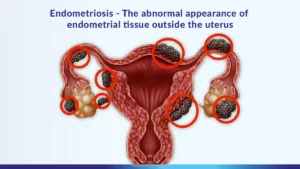
Endometriosis is the abnormal growth of endometrial tissue outside the uterus
Such abnormal growth of endometrial tissue disturbs nearby structures, resulting in pain and adhesions (scar tissue) on the internal body parts it touches. The aberrant tissue that develops outside the uterus in an endometriosis patient behaves similarly. Before ovulation, it becomes thicker, and during menstruation, it swells and leaks into places it shouldn’t.
Different stages of endometriosis
There are 4 different stages of endometriosis, with stage 1 being the least affected and stage 4 being the worst affected:
Stage 1 endometriosis:
Very few endometriosis implants are detected with no visible tissue scarring. This is the minimal endometriosis condition.
Stage 2 endometriosis:
Slightly more endometriosis implants are detected, but the overall quantity of aberrant tissue takes less than 2 inches of space in the abdomen with no visible tissue scars. This is known as mild endometriosis condition.
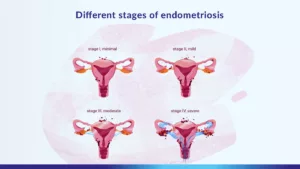
Endometriosis stages can be defined as minimal, mild, moderate and severe
Stage 3 endometriosis:
There is a significant development of endometriosis in the abdomen, some of which may be deep enough to lead to endometriomas (pockets of endometriotic fluid in the ovaries, also known as chocolate cysts). The ovaries or fallopian tubes may have scar tissue surrounding them. This is known as a moderate endometriosis condition.
Stage 4 endometriosis:
There is extensive development of endometriotic implants across the abdomen, along with the large possibility of big endometriotic cysts in the ovaries, and scar tissue around the ovaries or fallopian tubes or between the uterus and the rectum. This is known as a severe endometriosis condition.
Endometriosis and infertility
A complex interaction between endometriosis subtype, pain, inflammation, altered pelvic anatomy, adhesions, disrupted ovarian reserve/function and compromised endometrial receptivity as well as systemic effects of the disease define endometriosis-associated infertility.
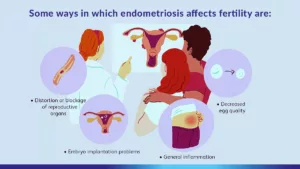
How endometriosis affects the fertility in women
Patients of endometriosis find it more troublesome to conceive and get pregnant – up to 30 – 50% of women diagnosed are affected by endometriosis-associated infertility.
Some ways in which endometriosis affects fertility are:
- Unsuccessful implantation of the embryo
- Scarring of the fallopian tubes
- Obstructing the growth of ova (egg)
- Hormonal imbalance
- Chronic inflammation of the pelvis
Endometriosis fertility treatment
It’s possible for women with Stages I and II endometriosis to conceive naturally. To further assist in successful implantation rates, doctors may perform a laparoscopy to surgically remove some implants. There is some evidence that surgically removing Stage I or II endometriosis may enhance pregnancy rates, while other data indicates that this may not help.
Another possible endometriosis fertility treatment for stages 1 and 2 is to administer Clomiphene citrate (a fertility medicine) for 5 days as soon as the woman’s menstrual cycle begins. The man is then required to give a sperm sample after the egg is released from the woman’s ovary for Intrauterine Insemination (IUI).
IUI is a type of artificial insemination where the sperm that has been washed and concentrated is placed directly in the uterus around the time the ovary releases one or more eggs to be fertilized.
Women with moderate to severe endometriosis are recommended to get the endometriotic cysts or scar tissues removed surgically to enhance the chances of conceiving. However, in some cases, the cysts come back even after multiple surgeries. This causes a depletion in the natural egg reserve of the patient, subsequently making it even more difficult to get pregnant.
If pregnancy does not occur within 6 months post-endometriosis surgery, alternative reproductive therapies should be considered.


